CIS
Non ci sono state sorprese. La Commissione elettorale ha comunicato che a spoglio quasi ultimato il presidente uscente Emomali Rakhmon ha ottenuto l’83% delle preferenze, mentre gli altri 5 candidati non hanno superato il 5%. Come da tradizione l’affluenza alle urne è stata altissima e si è attestata oltre l’86% degli aventi diritto.
Al potere dal ’92, Rakhmon ottiene così un nuovo mandato di 7 anni. Mai, nella sua storia post sovietica, in Tagikistan si è tenuto un ballottaggio. 500 circa sono stati gli osservatori internazionali presenti che hanno giudicato non positivamente le elezioni per “mancanza di una vera scelta”.
L’unica candidata con qualche possibilità non è stata ammessa alle consultazioni.
Paese montagnoso ai confini con l’Afghanistan, il Tagikistan è un passaggio obbligato per la droga verso i mercati ex sovietici. Le infiltrazioni estremistiche da sud sono state numerose in passato (un centinaio di tagichi combattono oggi in Siria con l’opposizione) ed il potere tiene sotto controllo i radicali.
L’economia locale si sorregge sulle copiose rimesse degli emigranti andati a cercar fortuna all’estero, principalmente in Russia, che mantiene sul confine afghano un’importante base militare.
Central Asia, The Chinese Silk Road.
7 Oct 2013 China has spent more than $50bn in the past three months on energy and infrastructure deals in central Asia as Beijing seeks to establish a “new Silk Road” through the region. 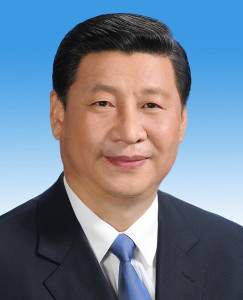
Chinese outbound investment totalled just over $100bn in the third quarter of 2013 with around half of that sum spent in the central Asian states visited by the Chinese president Xi Jinping on an official tour last month.
Xi visited Turkmenistan, Kazakhstan, Uzbekistan and Kyrgyzstan in September and signed sizable business deals with all four countries. The pattern of spending confirms that Chinese foreign investment flows are largely determined by the political leadership…
China has come under criticism for engaging in modern-day “colonialism” for its extensive energy and infrastructure investments and soft loans in Africa over the past decade. Beijing has also been accused of propping up repressive regimes in the continent. But others have pointed out that attitudes to China among many ordinary Africans are often more positive than attitudes towards Western states.
China’s largest financial agreements over the third quarter were related to energy infrastructure projects. In Kazakhstan China signed 22 agreements worth a combined total of $30bn. This included a $5bn deal for the China National Petroleum Corporation to acquire an 8 per cent stake in the Kashagan Oil & Gas field.
In Uzbekistan China signed 31 deals worth $15.5bn. The two countries agreed to build another oil pipeline, taking the total to four. And China is already funding the construction of an Uzbek-Chinese cross-border railway line. China concluded $7.6bn worth of deals in Turkmenistan, including the construction of a new pipeline. In Kyrgyzstan China signed eight agreements worth $5bn, the largest of which was a $1.4bn loan to build a new gas pipeline.
China also signed 36 co-operation agreements with an aggregate value of $1.5bn with Belarus. This included a soft loan from China’s state-owned development bank, Exim, to construct Belarus’s first nuclear power plant.
Full Article – The Independent. October 3rd, 2013.
Russia. Glonass also for satellites.
5 Oct 2013The Russian Defense Ministry is planning to use the country’s Glonass global positioning and navigation satellite network to operate other satellites in orbit. 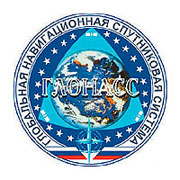
“Glonass will be used extensively in the future to control spacecraft,” said Sergei Berezhnoi, an aide to the head of the Titov Space Control Center, Russia’s main satellite control center.
According to the official, the Glonass system will also render automated assistance in the search for “missing” satellites with which operators on the ground have lost contact.
“In addition, this system could be used to help fix satellite glitches without the involvement of ground control facilities,” he added.
Glonass (Global Navigation Satellite System), which was officially launched in 1993, is Russia’s answer to the US Global Positioning System (GPS). It provides real-time positioning and speed data for surface, sea and airborne objects with an accuracy of one meter.
The Glonass system requires at least 18 operational satellites for continuous navigation services across the entire territory of Russia and 24 satellites to provide navigation services worldwide.
A group of 29 Glonass satellites is currently in orbit: 24 are currently in operation, three are spares, one is in maintenance, and one is in test flight phase, according to Russia’s space agency, Roscosmos.
By 2020, Russia plans to have 30 Glonass-M and new-generation Glonass-K satellites in orbit, including six in reserve, Roscosmos has said.
Russian President Vladimir Putin called on the members of the Commonwealth of Independent States (CIS) to join Glonass.
“This system has the capability to provide considerable benefits in the economic sphere, since it reduces cargo transportation costs on all transportation systems, and it definitely increases the safety of all types of transportation,” Putin said at a session of leaders of CIS member states in December 2012.
From Ria Novosti
The Cabinet of Ministers approved the draft Association Agreement between Ukraine and the European Union and its member states.
“It just became known that the government had approved the draft Association Agreement with the EU,” a government spokesman told journalists in Kyiv. The government published the draft agreement on the Web site of the Cabinet of Ministers in August 2013. 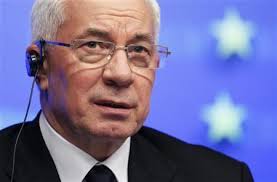
The 236-page document comprises of seven sections and 486 articles, some of which deal with the media activities, protection of personal data, protection of intellectual property, and other issues.
According to the draft agreement, the aims of association are to promote a gradual rapprochement between the parties based on common values and close and privileged links, and increasing Ukraine’s association with EU policies, and participation in programs and agencies, establish conditions for enhanced economic and trade relations leading towards Ukraine’s gradual integration in the EU internal market including by setting up a Deep and Comprehensive Free Trade Area, as well as to enhance cooperation in the field of justice, freedom and security with the aim of reinforcing the rule of law and the respect for human rights and fundamental freedoms.
Ukraine and the EU started negotiations on new agreement in 2007. The parties initialled an Agreement on association and profound and overall free trade area on March 30, 2012.
Ukrainian Prime Minister Mykola Azarov said the agreements, which should be signed at a November summit in Lithuania, raised the prospect of “a European quality of life” for the ex-Soviet republic.
“We believe we must make every effort for Yulia Tymoshenko to be freed before the Vilnius summit,” Iryna Gerashchenko, a deputy for the opposition party UDAR, told Interfax-Ukraine.
“Even though the signing is important to the EU and Ukraine, the EU will never be able to close its eyes to the violation of fundamental values such as human rights, including the right of defense in a court and the right to justice,” she said.
From Unian and Interfax-Ukraine
Kashagan, first oil volumes produced.
11 Sep 2013 The North Caspian Operating Company (NCOC) has reported the first oil has been extracted from Kazakhstan’s massive offshore Kashagan field.
The Kashagan field in the Caspian Sea has an estimated 4.8 billion tons of oil reserves as well as natural gas. 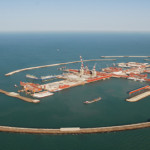
Production at the site is years behind schedule.
Partners in the NCOC are KazMunaiGaz, Italy’s Eni, France’s Total, the Anglo-Dutch company Royal Dutch Shell, the U.S. company ExxonMobil, and Japan’s Inpex.
Kazakhstan recently used its preemptive right to purchase a 8.45 percent share from ConocoPhillips and reports indicate Kazakh authorities will sell that stake to the China National Petroleum Corporation.
Turkmenistan – China, new gas agreements.
10 Sep 2013 The Chinese and Turkmen presidents announced the completion of the first phase of the Galkynysh gas field, which will supply gas to China.
China National Petroleum Corporation also signed a new contract to import gas from Galkynysh” the world’s second-largest gas field” a deal experts said will ensure China’s growing natural gas supply and help Turkmenistan secure a stable buyer.
President Xi Jinping and his Turkmen counterpart Gurbanguly Berdymukhamedov attended the ceremony marking the start of operation of three processing plants at Galkynysh in South Turkmenistan.
Insiders told China Daily that each plant has an annual output of 10 billion cubic meters of gas.
A plant jointly developed by China National Petroleum Corporation will send its products entirely to China, and some gas from the other two plants is also likely to be sent to China.
Turkmenistan is China’s largest supplier of natural gas, and China is the largest overseas market for Turkmenistan’s natural gas.
Xi and Berdymukhamedov said that the annual transport of 65 billion cubic meters of natural gas from Turkmenistan to China by 2016 will be ensured through the world’s longest natural gas pipeline.
In 2009, the two nations put into operation a pipeline of more than 8,000 km to bring vital energy supplies through China’s western region.
China imports about 40 billion cubic meters a year from Turkmenistan.
According to insiders, most of the newly added 25 billion cubic meters will be from Galkynysh.
China National Petroleum Corporation, the country’s largest energy producer, announced that it had signed an agreement with Turkmenistan to import 25 billion cubic meters of natural gas annually.
“By Sept 3, the total quantity of China’s natural gas import contracts were about 119.6 billion cubic meters (excluding the new contract of 25 billion cubic meters with Turkmenistan), which means that there is still a big shortage for China’s natural gas imports,” said Wang Ruiqi, a senior analyst with ICIS Energy.
She said the new contract with Turkmenistan will ensure China’s natural gas supply.
Turkmenistan holds the world’s fourth-largest natural gas reserves and possesses vast reserves of oil. It is estimated that 400 million people in China benefit from natural gas from Turkmenistan.
Full Article From China Daily Sept. 5th, 2013.
Georgia’s Olympic Committee decided that its athletes will compete at the 2014 Winter Olympics in Sochi, scotching earlier suggestions they would boycott the event being hosted by arch-foe Russia. “Today the Georgian National Olympics Committee, at its extraordinary session, decided that Georgia’s Olympic team will take part in the 2014 Olympic Games,” the committee’s first vice-president Elguja Berishvili told AFP. 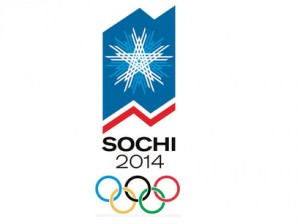
The Games will be held in Sochi, near Russia’s border with the breakaway region of Abkhazia, which Georgia claims as part of its territory, while Russia considers it independent and maintains a large military presence there.
The debate over a boycott reflects Georgia’s political fault lines. The party of President Mikhail Saakashvili has floated the idea of a boycott, while his implacable opponent Prime Minister Bidzina Ivanishvili said Georgia will “definitely” take part.
Large scale military actions were launched in South Ossetia in Georgia on August 8 2008. Later Russian troops occupied Tskhinvali and expelled the Georgian military. Russia recognized the independence of South Ossetia and Abkhazia late in August. Tbilisi ended diplomatic relations with Moscow in response and has announced the two unrecognized republics to be occupied territories.
Relations between the two countries have thawed since billionaire Bidzina Ivanishvili’s coalition triumphed at parliamentary elections last October. Ivanishvili has made normalising ties with Russia his foreign policy priority.
Ukraine has said it wants to strengthen human rights during its term – while facing criticism for its own democratic credentials.
Opposition leader Tymoshenko was sentenced to seven years imprisonment in a trial that drew wide international criticism. As a result, she was unable to take part in parliamentary elections in late October, which the OSCE observer mission declared to be unfair and a “step backwards.” 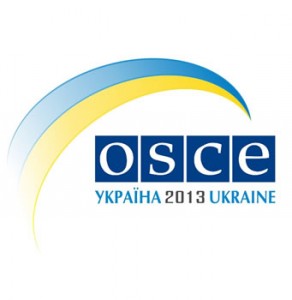
Susan Stewart at the Berlin-based German Institute for International and Security Affairs (SWP) also believes that Ukraine’s reputation has suffered in recent years because of human rights violations and backpedalling on democracy. “That’s why I think it will be difficult for Ukraine to exercise strong leadership,” Stewart said.
Ukraine is the second former Soviet republic to assume the OSCE presidency after Kazakhstan in 2010, which paved the way. But Kazakhstan was also criticized for human rights violations.
The OSCE was created during the Cold War to serve as a forum for dialogue between the warring blocs in the East and West. Today, the Vienna-based organization unites 57 nations from Europe, Central Asia and North America. It fights terrorism, seeks to resolve conflicts and helps protect the environment. Observing human rights and fundamental freedoms is a key part of OSCE’s security concept.
Old divisions threaten to paralyze its work.
Complete Article – Roman Goncharenko – Deutsche Welle
OSCE-Ukraine
Ukraine’s representative at the negotiations on the Transdniestrian conflict settlement, Ihor Kharchenko has said that the Transdniestrian conflict settlement will be the No. 1 priority during Ukraine’s presidency of the OSCE in 2013.
Ukraine, a transparent vote?
27 Oct 2012 The parliamentary election in Ukraine will be “transparent and democratic,” President Victor Yanukovych has said. Following an example from Russia, Ukraine has installed webcams in all polling stations for maximal transparency.
The Organization for Security and Co-operation in Europe (OSCE) has sent 635 election observers to the country – more than ever before. In total, some 3,800 foreign observers monitor the vote. But only 8.8 percent of Ukrainians say the ballot will be fair, according to the Kiev-based Democratic Initiative Fund. 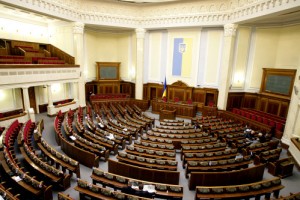
“The significant lack of political pluralism on television is very worrisome and requires immediate action,” EU foreign policy chief Catherine Ashton highlighted in a statement. The elections “will be a litmus test of Ukraine’s democratic credentials.”
The last time that Ukraine had a mixed election system – electing half of its 450 members of parliament in geographic districts, the other half through party lists – was 2002. Ten years ago, the opposition did well on the party lists, but failed to muster a majority after doing poorly in the single-mandate districts. Experts think that history will repeat itself.
The parliamentary vote marks the halfway point in Yanukovych’s first presidential term. Yanukovych’s approval rating is 12.6 percent, down from 37.8 percent in 2010, according to the Razumkov Center for Economic and Political Studies.
Polls suggest his party, the Party of Regions, will preserve its hold on the 450-seat legislature. The Party of Regions has 23.3 percent backing, compared with 16 percent for world boxing champion Vitaly Klitschko’s UDAR, 15.1 percent for Tymoshenko’s Fatherland and 10.1 percent for the Communists.
Control of Parliament will also be a major factor in the higher-stakes presidential contest in 2015. Vitali Klitschko the leader of the opposition UDAR party, seems to be a new future candidate with good chances to win.
Andriy Shevchenko, 36, a former AC Milan striker, runs for Ukraine Forward, which aims to pass parliament’s 5 percent entry barrier. That’s hurting opposition united under jailed ex-Prime Minister Yulia Tymoshenko and improving the prospects of Party of Regions.
The country has become increasingly isolated since Yanukovich’s election in a runoff with Tymoshenko in 2010. And financial analysts say that the country’s economy is in trouble again as a result of flagging demand in Europe, particularly for steel, Ukraine’s main export.
The Georgian parliament approved the new government of Georgia, led by Prime Minister Bidzina Ivanishvili.
This is its composition:
Defense Minister and Deputy Prime Minister – Irakli Alasania
Energy Minister and Deputy Prime Minister Kakha Kaladze 
Minister of Finance – Nodar Khaduri
Interior Minister – Irakli Garibashvili
Minister of Justice – Thea Tsulukiani
Minister of Foreign Affairs – Maya Panjikidze
Minister for Reintegration – Paata Zakareishvili
Minister for Infrastructure and Regional Government – David Narmania
Economy Minister – Giorgi Kvirikashvili
Minister of Labour, Health and Social Affairs – David Sergeenko
Minister of Environment – Khatuna Gogaladze
Minister of Education and Science – Giorgi Margvelashvili
Minister of Refugees and Accommodation – David Darakhvelidze
Minister of Youth and Sports – Levan Kipiani
Minister of Penitentiary – Sozar Subari
Culture Minister – Guram Odisharia
Agriculture Minister – David Kirvalidze
State Minister for Diaspora Affairs – Kote Surguladze
State Minister for European Integration – Alexi Petriashvili.
Minister for Employment – Kakha Sakandelidze
Talks about constitutional changes have already started in the new parliament. “In order to avoid one party government, it is already necessary to make changes in the relevant part of the constitution and create applicable government model. However, we will make these changes after public discussions. We will try hard to take into account all sensible proposals and interests. The constitution will establish the model that will guarantee stability of the state,” said Prime Minister Ivanishvili. The new Constitution will give political opposition mechanisms for controlling government activities.
Under current legislation the change in the Constitution can be made if 2/3 of lawmakers (100 MPs) vote for it. Ruling Georgian Dream currently has 85 seats, while the opposition United national Movement – 65 mandates.
The main goal of the new government will be de-occupation of Georgia. “At the same time, we will look for the ways of talking to Abkhazians and Ossetians. With the support of international society we will manage to start negotiations with Russia about economic and cultural affairs,” said Ivanishvili. The territorial integrity of the country is vital for the government to be effective. Important steps will be taken towards integration with the EU and NATO.
Welcome
We are a group of long experienced European journalists and intellectuals interested in international politics and culture. We would like to exchange our opinion on new Europe and Russia.
Categories
- Breaking News (11)
- CIS (129)
- Climate (2)
- Energy&Economy (115)
- EU Eastern Dimension (85)
- Euro 2012 – Sochi 2014 – World Cup 2018, Sport (43)
- Euro-Integration (135)
- History Culture (198)
- International Policy (261)
- Military (74)
- Interviews (18)
- Italy – Italia – Suisse (47)
- Odd Enough (10)
- Poland and Baltic States (126)
- Religion (31)
- Russia (421)
- Survey (4)
- Turning points (4)
- Ukraine (176)
- Российские страницы (113)
Archives
- November 2020
- October 2020
- September 2020
- August 2020
- July 2020
- May 2020
- April 2020
- March 2020
- January 2020
- December 2019
- November 2019
- October 2019
- September 2019
- August 2019
- July 2019
- June 2019
- May 2019
- April 2019
- March 2019
- February 2019
- December 2018
- November 2018
- October 2018
- September 2018
- August 2018
- July 2018
- June 2018
- May 2018
- April 2018
- March 2018
- February 2018
- January 2018
- December 2017
- November 2017
- October 2017
- September 2017
- August 2017
- July 2017
- May 2017
- March 2017
- January 2017
- December 2016
- November 2016
- October 2016
- September 2016
- July 2016
- June 2016
- May 2016
- April 2016
- February 2016
- January 2016
- November 2015
- October 2015
- September 2015
- June 2015
- April 2015
- March 2015
- February 2015
- January 2015
- December 2014
- November 2014
- October 2014
- September 2014
- August 2014
- July 2014
- June 2014
- May 2014
- April 2014
- March 2014
- February 2014
- January 2014
- December 2013
- November 2013
- October 2013
- September 2013
- August 2013
- July 2013
- June 2013
- May 2013
- April 2013
- March 2013
- February 2013
- January 2013
- December 2012
- November 2012
- October 2012
- September 2012
- August 2012
- July 2012
- June 2012
- May 2012
- April 2012
- March 2012
- February 2012
- January 2012
- December 2011
- November 2011
- October 2011
- September 2011
- August 2011
- July 2011
- June 2011
- May 2011
- April 2011
- March 2011
- February 2011
- January 2011
- December 2010
- November 2010
- October 2010
- September 2010
- August 2010
- July 2010
- June 2010
- May 2010
- April 2010
- March 2010
- February 2010
- January 2010
- December 2009
- November 2009
- October 2009
- September 2009
- August 2009
Our books




